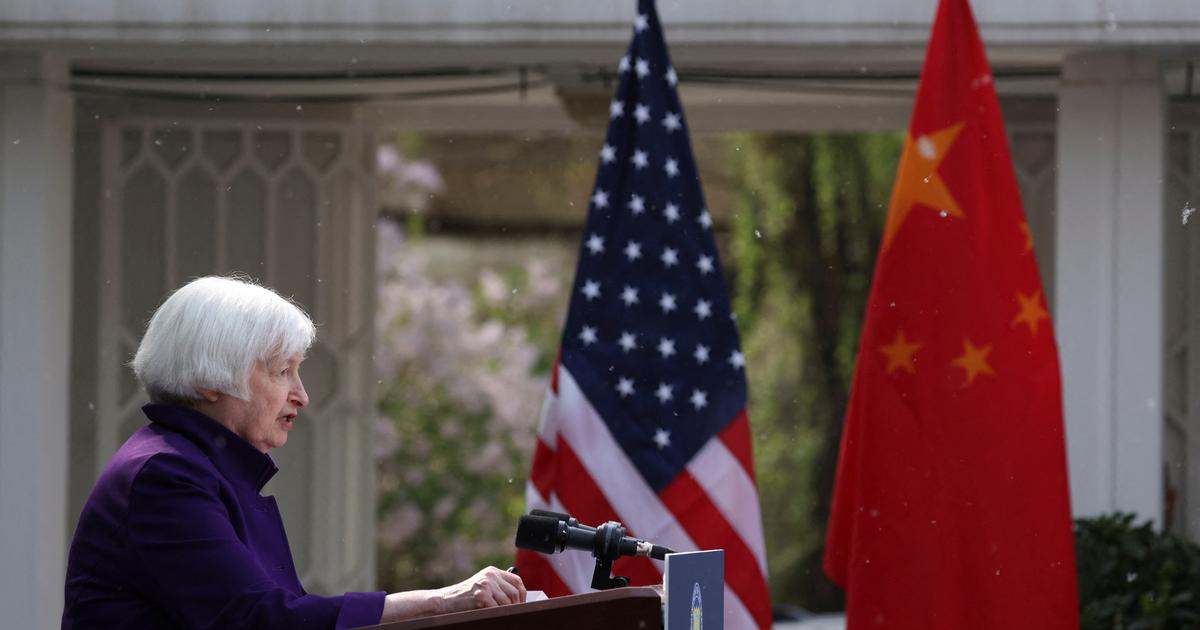Did China cry victory too quickly? While Europe is counting new coronavirus contaminations every day, the second world power seemed (almost) out of the woods. After two months of confinement, restrictions have eased in the country. Restaurants fill up little by little and cars circulate again in the capital, specifies the correspondent in China of the Canadian daily newspaper "The Globe & Mail". The factories have reopened gradually. As a result, the national economy would now run at three-quarters of its usual pace, according to data compiled by the Beijing-based consulting firm Trivium China.
Likewise, the province of Hubei, the cradle of the pandemic, has gradually reopened its doors. Wuhan local station resumed on Saturday receiving trains from elsewhere and traffic resumed on the highways. Even if the inhabitants, still in confinement, will have to wait until April 8 to be able to leave the city. Triumphalism seemed to win the country. A pro-government Chinese newspaper again proclaimed on March 24 "China's victory over the Covid-19". A surge of optimism relatively hampered by new figures for contamination that have occurred in recent days in the country.
Dozens of new infections every day
While local transmissions have "practically stopped", the cases of imported contamination are likely to confront Beijing with a second epidemic wave, warned on Sunday an official of the Chinese health authorities. Contaminations are counted every day by the dozen, according to figures from the Chinese National Health Commission.
Three main centers stand out: Beijing, Shanghai (the most populous city in the country with 24.15 million inhabitants) - and the region of Hong Kong. On March 24, there were 21 new infections in the capital, 10 in Shanghai and no less than 30 in the Hong Kong region. 90% of these new cases come from Chinese returning from abroad, according to the government.
Fearful of seeing the figures soar, China announced on Thursday that its borders would be closed to most foreigners, even resident visa holders. The territory is therefore closed to non-Chinese (except diplomats) until further notice, since midnight Friday. A measure that reflects a "real fear of the authorities," says Antoine Bondaz, a researcher at the Foundation for Strategic Research. “The country has entered a new phase. It is no longer a question of fighting the epidemic a few weeks ago, but rather of avoiding any new outbreak of cases. "
"A silent spread"
But if the closure of borders curbs the risk of spread, the threat could also already be found ... within the country. "There is always a risk that infected people, with little or no symptoms, have gone under the radar," said the researcher. A "silent spread" that could be potentially dangerous. As a reminder, healthy carriers can just as easily transmit the virus to other people who may develop more serious symptoms.
The hypothesis of a second wave is nothing fanciful, believes for its part, Michèle Legeas, teacher at the School of Advanced Studies in Public Health (EHESP). "In the history of pandemics, we have sometimes seen successive waves of contamination hitting a country when there was no vaccine or when the population had not yet been globally affected," says this management specialist. health risk situations.
VIDEO. A family confined in 11 m²: "We are obliged to have a quasi-military organization"
A still vulnerable population
According to the principle of collective immunity, the more people are infected with a disease, the more they develop antibodies against the virus and the less the epidemic spreads among the population. "However, in the case of the coronavirus, a large part of the population, including in China, has not been in contact with the infectious agent," adds the teacher.
Newsletter - The essentials of the news
Every morning, the news seen by Le ParisienI'm registering
Your email address is collected by Le Parisien to allow you to receive our news and commercial offers. Find out more
And to underline a paradox: “Quarantine is both very effective because it temporarily prevents deaths, but it prevents the immunization of the population who will always be vulnerable to the virus. If people all start to move again, the epidemic will inevitably progress. "
Difficult however to defend the application of this principle of immunity. And for good reason: its effects would be devastating. "Globally, the deaths would be in the millions. No country can assume this risk ”, recognizes the specialist.
A second wave possibly better controlled
However, if the number of infections is likely to increase in China, the country is unlikely to relive such an explosion of cases as in January. “People keep their distance and always pay attention. Especially since they are wary of government figures. The country is also better equipped and scientists know more about the virus, ”says Antoine Bondaz.
An opinion shared by Michèle Legeas: “We should not be alarmed because a new wave does not necessarily mean a new wave of deaths. New contaminations would be better controlled. China could return to the first stage, isolating only suspect patients. And who tells us that by then, effective treatments will not start to be developed? She concludes, optimistic.



/cloudfront-eu-central-1.images.arcpublishing.com/prisa/XU5TW47UO5E65LAD4SJM6DIGU4.jpg)

/cloudfront-eu-central-1.images.arcpublishing.com/prisa/2S37M3K3RRCEBPSIBWEYNJ2BHE.jpg)



